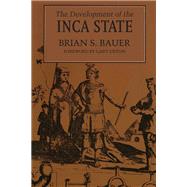The Development of the Inca State
, by Bauer, Brian S.- ISBN: 9780292715639 | 0292715633
- Cover: Hardcover
- Copyright: 11/1/1992
The Inca empire was the largest state in the Americas at the time of the Spanish invasion in 1532. From its political center in the valley of Cuzco, it controlled much of the area included in the modern nations of Ecuador, Peru, Chile, and Bolivia. But how the Inca state became a major pan-Andean power is less certain. In this innovative work, Brian S. Bauer challenges traditional views of Inca state development and offers a new interpretation supported by archaeological, historical, and ethnographic evidence.
Spanish chroniclers of the sixteenth and seventeenth centuries attributed the rapid rise of Inca power to a decisive military victory over the Chanca, their traditional rivals, by Pachacuti Inca Yupanqui, a young warrior-king, and to the Incas' ability to unify the various ethnic groups of the region. By contrast, Bauer questions the usefulness of literal interpretations of the Spanish chronicles and provides instead a regional perspective on the question of state development. He suggests that incipient state growth in the Cuzco region was marked by the gradual consolidation and centralization of political authority in Cuzco, rather than resulting from a single military victory. Synthesizing regional surveys with excavation, historic, and ethnographic data, and investigating broad categories of social and economic organization, he shifts the focus away from legendary accounts and analyzes more general processes of political, economic, and social change. Ultimately, Bauer's work stresses the need for broader forms of historical consciousness in studying the development of the Inca state, moving beyond the study of kings and battles to examine classes of individuals and entire geographic regions.
Spanish chroniclers of the sixteenth and seventeenth centuries attributed the rapid rise of Inca power to a decisive military victory over the Chanca, their traditional rivals, by Pachacuti Inca Yupanqui, a young warrior-king, and to the Incas' ability to unify the various ethnic groups of the region. By contrast, Bauer questions the usefulness of literal interpretations of the Spanish chronicles and provides instead a regional perspective on the question of state development. He suggests that incipient state growth in the Cuzco region was marked by the gradual consolidation and centralization of political authority in Cuzco, rather than resulting from a single military victory. Synthesizing regional surveys with excavation, historic, and ethnographic data, and investigating broad categories of social and economic organization, he shifts the focus away from legendary accounts and analyzes more general processes of political, economic, and social change. Ultimately, Bauer's work stresses the need for broader forms of historical consciousness in studying the development of the Inca state, moving beyond the study of kings and battles to examine classes of individuals and entire geographic regions.






